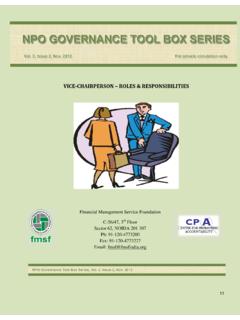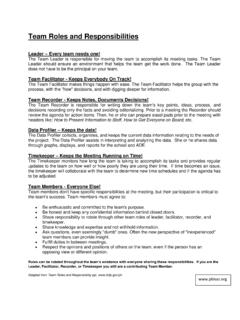Transcription of CHAPTER FOUR Roles and Responsibilities in …
1 27A clinical trial is a study done in human subjects to investigate a potential new drug, device or biologic product. There are three primary groups in-volved in the conduct of clinical trials: sponsors, clinical investigators and IRBs. In this CHAPTER , we will look at the specific regulatory Responsibilities each of these three has when it comes to conducting clinical trials. Also involved are regulatory agencies (FDA, HSS), and the human subjects who participate in trials. Although we will discuss many of these Responsibilities in more detail in other chapters, this CHAPTER will give you a summary of re-sponsibilities as they appear in FDA the regulations (21 CFR (b)), a sponsor is defined as a person who takes responsibility for and initiates a clinical investigation.
2 The sponsor may be an individual or a pharmaceutical For our purposes in this book, a sponsor is the pharmaceutical or device company that initiates a clin-ical trial for one of its products. The regulatory Responsibilities of sponsors are found primarily in 21 CFR 312, subpart D ( Responsibilities of Sponsors and Investigators).Sponsors are responsible for: Selecting qualified investigators. Providing the investigators with the information they need to conduct an investigation properly. Ensuring proper monitoring of the investigation. Ensuring that the investigation is conducted in accordance with the general investigational plan and protocols contained in the IND. Maintaining an effective IND with respect to the FOURR oles and Responsibilities in Clinical Trials The CRA s Guide to Monitoring Clinical Research28 Ensuring that the FDA and all participating investigators are promptly informed of significant new adverse effects or risks with respect to the drug.
3 Additional specific Responsibilities of sponsors are: Selecting only investigators who are qualified by training and experience as experts to investigate the drug. Shipping investigational new drugs only to investigators who are partici-pating in the investigation. Obtaining the appropriate information from the investigator. Selecting monitors who are qualified by training and experience to monitor the progress of the investigation. Monitoring the progress of all investigations involving an exception from informed consent. Giving each participating clinical investigator an investigator brochure. Keeping each participating investigator informed of new observations discovered by or reported to the sponsor on the drug, particularly with respect to adverse effects and safe use.
4 Monitoring the progress of all clinical investigations being conducted under the sponsor s IND. Upon discovering that an investigator is not complying with the Form FDA-1572, the general investigational plan or the regulations, will promptly either secure compliance or discontinue shipments of the investigational new drug to the investigator and end the investigator s participation in the investigation. Reviewing and evaluating the evidence relating to the safety and effec-tiveness of the drug as it is obtained from the investigator. If determining that its investigational drug presents an unreasonable and significant risk to subjects, the sponsor will discontinue those investigations that present the risk, notify the FDA, all institutional review boards and all investigators who have at any time participated in the investigation of the discontinuance.
5 Maintaining and retaining adequate records and reports. Permitting the FDA to inspect records and reports relating to the clinical investigations. Maintaining written records of the disposition of the investigational drug. This means that the sponsor is essentially responsible for all operational aspects of the clinical trials it 4 Roles and Responsibilities in Clinical Trials29 Institutional Review Boards (IRBs)In the regulations (21 CFR (g)), an IRB is defined as any board , com-mittee or other group formally designated by an institution to review, ap-prove the initiation of and conduct periodic review of biomedical research involving human subjects. The primary purpose of such review is to assure the protection of the rights and welfare of the human subjects.
6 As a side note, institution means any public or private entity or agency (including federal, state and other agencies), including hospitals, universities, private medical clinics and so our purposes, an IRB is a committee that formally reviews and ap-proves a trial before it can start with the primary goal of protecting human subjects of research. There is an entire CHAPTER devoted to IRBs in the book, but we will summarize their Responsibilities here, in order to compare and contrast them with those of sponsors and regulatory Responsibilities of IRBs are found primarily in 21 CFR 56 (Institutional Review Boards).21 CFR 56 requires that IRBs: Follow regulations regarding IRB organization and personnel. Follow written procedures, including those for: Conducting initial and continuing review of research and reporting those findings to the investigators.
7 Determining which projects require review more often than annually. Ensuring prompt reporting to the IRB of changes in the research. Ensuring that changes are not implemented before IRB review, except where necessary to eliminate apparent immediate hazards to human subjects. Promptly report to the IRB, institution and FDA any: Unanticipated problems involving risk to human subjects. Any instance of serious or continuing noncompliance with regula-tions or IRB requirements. Any suspension or termination of IRB approval. Review proposed research at convened meetings with a majority of members present, including at least one member whose primary con-cerns are non-scientific. Require that information given to subjects as part of informed consent meets the regulations.
8 Notify investigators in writing of its decision to approve or disapprove the proposed research, or of any modifications required to secure ap-proval.






